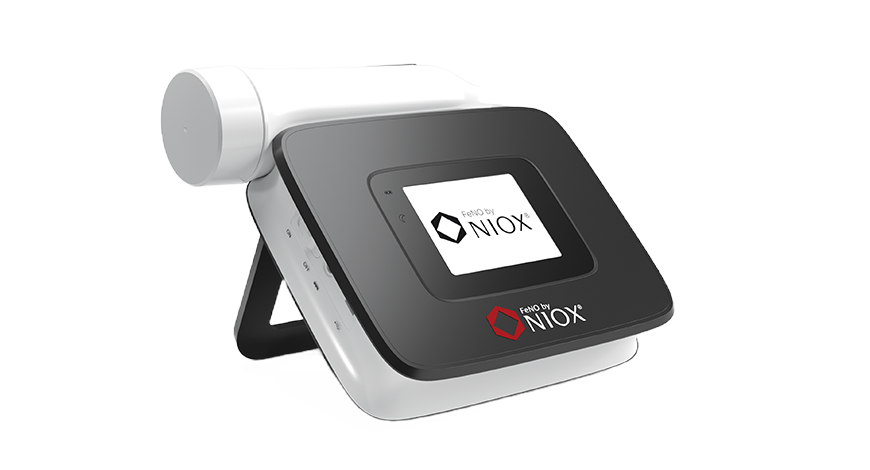Product Watch
NIOX VERO® marketed by Schiller Healthcare India Pvt. Ltd.

Patients with suspected asthma can vary greatly in age at onset, clinical presentation, triggers, severity and response to treatment, making diagnosis complex. In addition, several other diseases often have the same symptoms, such as chronic obstructive pulmonary disease (COPD), gastroesophageal reflux disease (GERD) or vocal cord dysfunction.
Type 2 inflammation is mainly driven by interleukins IL-4, IL-5 and IL-13. These cytokines are involved in the recruitment and production of immunoglobulin E (IgE), eosinophils and nitric oxide (NO), which is then released in exhaled breath as FeNO (fractional exhaled nitric oxide).
FeNO is used to measure the level of airway inflammation in patients’ lungs. It correlates directly with the level of inflammation present in the lungs. FeNO testing is simple, immediate and non-invasive. It is the most convenient way to assess airway inflammation, right at the point-of-care. It is safe and easy to perform, even when lung function is severely reduced, and can help improve outcomes in asthma patients from the age of four.
Healthy airway epithelial cells produce NO and low levels of exhaled NO are normal. When Type 2 inflammation (the type of inflammation responsible for up to 84% of asthma cases) is present in the airways, interleukins such as IL-4 and IL-13 upregulate the activity of the iNOS (inducible Nitric Oxide Synthase) enzyme, which produces NO in the airway. Levels of exhaled NO are increased, giving healthcare professionals an objective measure of airway inflammation.
In 2011, the American Thoracic Society (ATS) produced a guideline recommending the cut-off points still used every day to interpret FeNO today. The cut-off points were derived from a large number of studies, where 83% of participants used NIOX® devices. NIOX® technology remains the FeNO device of choice in clinical studies to this day.
Airway inflammation is a key characteristic of asthma but it is not currently routinely measured. As a result, the condition is frequently underestimated in 50% of patients. This is even more common in patients with high inflammation, 2/3 of whom may not be identified. A tailored approach to managing personal risk factors is essential to improve patient outcomes. Targeting and treating airway inflammation, a key characteristic of asthma, has been proven to be effective in reducing the risk of exacerbations.
FeNO is the most convenient biomarker of airway inflammation. FeNO levels are elevated in asthma and reduced with steroid therapy, making FeNO testing a helpful tool when personalising asthma care for each individual. Regular monitoring of asthma is crucial to keep a close eye on the patient’s future risk. It takes less than two minutes to perform a FeNO test and see the results at the point-of-care, and it can be repeated at each visit. A FeNO suppression test, usually performed over five to seven days with inhaled corticosteroids (ICS) doses being observed, can help determine whether a patient on ICS has been adherent with therapy.
The currently available biologics mostly include Type 2-targeted therapies. Before being prescribed this type of biologic, patients should be evaluated to ensure their asthma is caused by underlying Type 2 inflammation. FeNO testing is strongly recommended to diagnose Type 2 airway inflammation. The severe asthma guidelines produced by GINA, ERS and ATS suggest that a FeNO value >20 ppb supports a diagnosis of Type 2 inflammation.
Once a case of Type 2 inflammation and severe asthma has been established, FeNO testing can help with the selection of a personalised, targeted therapy by identifying appropriate candidates for biologic treatments.
Different biologics target different pathways, most of which have a role for FeNO. For example, a FeNO measurement >20 ppb predicts a good response to anti-IgE therapy (omalizumab), while a FeNO value >25 ppb indicates the patient is likely to respond well to anti-IL4R (dupilumab). Evidence shows FeNO levels can be reduced by up to 40% with dupilumab.
Schiller Healthcare India Pvt. Ltd. is distributing the NIXO® FeNO devices in India.














